
We asked, and you answered! Family Lawyer Magazine sent a survey via newsletter asking family law professionals to answer questions about the impact technology has had on their practices in July and August 2019, and we received responses from 84 people. That sounds low, but it is actually statistically relevant. At a confidence level of 95%, the margin of error is 10.75% for 84 respondents; at a confidence level of 90%, the margin of error drops to 9%. (“Confidence level” is the probability that our sample accurately reflects the attitude of the survey’s population, and the “margin of error” is the range that the population’s responses may deviate from our sample size. A 95% confidence level means we can be 95% certain that our results are accurate; most researchers use the 95% confidence level.)
Most of the respondents were family lawyers (88.1%); here are the other professions represented in the survey results:
- 20.2% were mediators;
- 7.1% were Certified Divorce Financial Analysts;
- 2.4% were arbitrators
- 2.4% were Certified Financial Planners
- 1.2% (each) were private judges, collaborative law lawyers, collaborative professionals, civil litigators, paralegals, and business valuators.
Of course, some respondents had more than one occupation: e.g., family lawyer and mediator.
Family Law Professionals and Technology: Survey Results
1. Do you and/or your firm use the cloud for document storage?
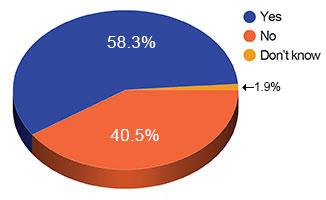
2. Do you know for a fact that your email, documents, and network are secure?
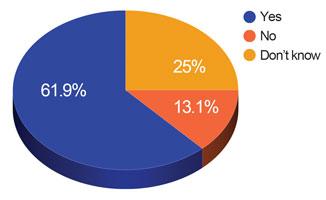
3. Do you use an online billing and payment system?
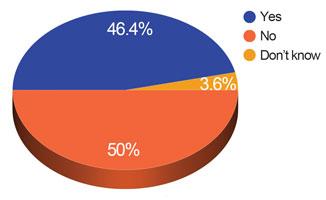
4. How do you track your billable hours?
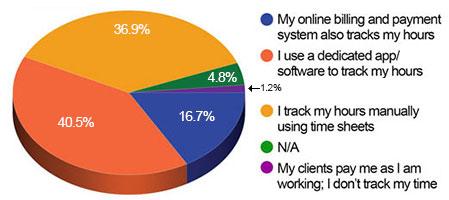
5. What software or apps do you find indispensable to your family law practice?

Some of the responses were eye-opening: for example, 39.6% of respondents are manually tracking their billable hours on timesheets, and only 7.1% are currently using some form of Artificial Intelligence (AI). The second statistic is somewhat troubling because experts are urging family law professionals to “Get on board now or get left behind.” Colin Rule, who co-founded ODR service provider Modria, notes that: “Technology is disrupting the law – and this disruption may generate significant opportunities for those attorneys willing to embrace change and evolve their practices.”
Here is what you had to say about AI, as well as some predictions about how technology is going to impact the practice of family law over the next decade.
How Do You Use (or Plan to Use) Artificial Intelligence in Your Practice?
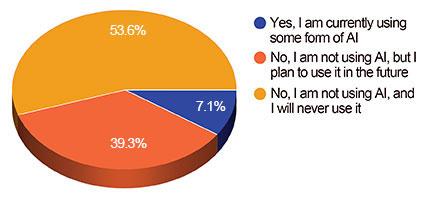
“Rather than say I will never use AI in my practice, the better answer for me is that I would consider using it if I knew more about how it would make client communication better and attorney/staff time more productive. I don’t have any plans for it now, but I’m open to learning more about it.” – Mary Ann Burmester (Family Lawyer)
“I don’t know at this point. I am currently working with an IT consultant and a provider to decide how we can make technology, including AI, work best for us.” – Lucinda Glen (Family Lawyer)
“I plan to use it for research and office automation.” – Philip S. Burnham, II, Esquire (Family Lawyer)
“Not sure. I haven’t seen a use that fits my practice. I have concerns about applying logic (AI) to an illogical and emotion-driven system.” – Bruce Avery (Family Lawyer)
“Caselaw research, intake software.” – MacKenzie Dunham (Family Lawyer)
“eDiscovery and document preparation.” – Jody Stahancyj (Family Lawyer)
“Research and organization.” – David Hoffmann (Family Lawyer)
“In civil commercial litigation cases, when large numbers of documents are produced.” – Steven E. Feder (Family Lawyer, civil litigation)
“I do not know at this point, but it is the wave of the future.” – Anonymous (Family Lawyer)
“I don’t know yet. I need to learn about what added value it will bring.” – Nora Kalb Bushfield (Family Lawyer)
“I have no current information on this subject but hear that it is coming.” – Robert H. German (Family Lawyer)
“I don’t have plans to because I don’t know how it would apply to my practice.” – Anonymous (Family Lawyer)
“Not sure yet.” – Paul Stenzel (Family Lawyer, Mediator)
“Aren’t all my apps and PC software above AI?” – Claudia Munoz (Family Lawyer)
“Chat.” – Geoffrey Platnick (Family Lawyer)
“For financial planning, perhaps.” – Adrienne Grace (CDFA®, CFP®)
“Our family law practice requires direct communication with our clients going through difficult times. AI may be difficult to integrate.” – Leslie Barrows (Family Lawyer, Mediator)
“For financial statements. AI-assisted software can help to guide clients through the disclosure process to produce accurate financial statements – and there’s less wiggle-room for them to claim that they “forgot” certain assets because the software prompts them to “remember” to list everything. AI-assisted software can also streamline the disclosure process into simplified language, intuitive questions, and bite-sized steps so that clients can keep on top of what is required of them. This means financial statements will be completed quicker, with less upset, and all necessary data should be there the first time.” – Anonymous (CDFA®)
“Don’t know.” – Anonymous (Family Lawyer; Mediator)

How Will Technology Impact Your Practice Over the Next Decade?
“We are not going to waste money on traditional marketing like phone book listings. We are not going to waste money on square footage. We are designing and building a new office space that uses technology to make our attorneys and staff more efficient and mobile. Many of our younger clients do not want to talk to us on the telephone or meet in our conference room. They want to email us and text us. We are going to make it easy for them to communicate with us in a way that works for them when it works for them.” – Lucinda Glen (Family Lawyer)
“It will continue to evolve, but I hope we do not end up using electronic filing for Family Court – there are too many ways things can go wrong and that personal information and identities can be hacked.” – Anonymous (Family Lawyer)
“The majority of my family law cases have some element of technology affecting the outcome. For example, adulterers are being caught by their text messages, emails and even memberships to hook-up sites. Also, clients have emergencies on the weekends and need attorney assistance. Being able to securely log on to my firm’s documents from anywhere helps me to assist my clients.” – Darlene Lesser (Family Lawyer)
“Significantly more automation overall as it relates to administrative work. We’re seeing more clients having a preference for online scheduling on their own time. I also foresee more and more lawyers use paperless systems at the courthouse. i.e. losing the paper notebooks in favor of digital files.” – MacKenzie Dunham
“Cybersecurity continues to be a concern.” – Nora Kalb Bushfield
“I plan to use it for research and office automation.” – Philip S. Burnham, II (Family Lawyer)
“Technology has radically changed the way I practice during the 30+ years I’ve been a lawyer and I expect it to continue, which means I need to continue to learn to use it. One concern I have is the speed with which clients expect/demand answers. There’s less time to think through complicated situations and the pressure to respond sometimes leads to more “off the cuff” answers that aren’t necessarily the best ones from a strategic perspective. Maintaining boundaries has become more difficult because some clients don’t respect nights and weekends, and they get testy if I wait until Monday to respond. On the other hand, the Internet and computer networking allow me to travel more and be able to work from virtually anywhere, so I have to accept the bad with the good.” – Mary Ann Burmester
“[Technology] levels the playing field in many ways for small/solo vs. biglaw.” – Steven E. Feder (Family Lawyer)
“Expanding market within the state due to e-filing and video conferencing.” – Paul Stenzel
“Technology has already changed the practice of Family Law in significant ways. Most evident is the increased expectation of immediate access to attorneys and the increased expectation of a response. The upside is how efficient email makes the practice. We’re far more able to respond to clients faster and to juggle more cases. Additionally, the ability to scan, email, and eSignatures make all parts of the practice faster and easier on both sides. It has also made billing easier and payments easier to handle.” – Traci Capistrant (Family Lawyer)
“I think that everything will continue to move more digital and electronic. There have been some issues with e-filing so I am concerned about that. I also have concerns about hackers and how they might be able to mess with the clerk’s filings at the courthouses.” – Michael Strauss (Family Lawyer, Mediator)
“We are all already using many forms of technology for our practice. Between our smartphones, drafting programs, calculators of support, storage and email, we can no longer practice without the above technology. I anticipate eFiling will only increase our dependence on these technologies and future apps to come.” – Claudia Munoz
“The cost of keeping up with technology is my biggest concern. Expensive for a solo practitioner.” – Susan E. Murray (Family Lawyer, Mediator, Arbitrator)
“It will completely automate most mundane tasks and many lawyers will no longer have jobs. Think Bank tellers and tax preparers – both dying fields. Creative, out-of-the-box kind of thinking will still be in demand; ______ fill in the blanks will be gone.” – Jody Stahancyj (Family Lawyer)
“More cloud will be used. I am concerned with data breaches with secure servers. Banks get hacked. Businesses get hacked. Those are high-profile targets, though.” – F. Peter James (Family Lawyer)
“I answered your question about whether things are secure in the affirmative, but I know, in reality, that nothing is secure so long as you are connected to the internet and you use attached computers in your practice.” – Bruce Avery
“Uncertain.” – Robert H. German (Family Lawyer)
“It will become more helpful as we seniors age out. I’m concerned about security. Your question about whether I know for certain that my email, documents, etc., are secured is a joke. While I think all of my security systems are working I don’t believe for a minute that they really are 100% secure. When we first got the internet we were warned that it was “the wild wild west” out there. Guess what? It still is.” – Anonymous (Family Lawyer, Mediator)
“I plan to leave the practice within the next 18 months.” – Anonymous (Family Lawyer; Mediator)
“I hope not to be practicing for another decade.” – Anonymous (Family Lawyer, Mediator)
“I think more and more of what we lawyers do can be outsourced to AI.” – Anonymous (Family Lawyer)
“[Technology will] force an early retirement!” – Anonymous (Family Lawyer)
“I wish I knew!” – Anonymous (Family Lawyer)
“It will become less and less necessary to have human assistants because computers are doing more and more of the word processing and analyzing now than ever before.” – Anonymous (Family Lawyer)
“I wish I knew.” – Anonymous (Family Lawyer)
“I truly believe that younger generations will refuse to divorce in the same way and that they will insist on the introduction of technology into this previously underserved area of the law. Millennials will not engage in a process of in-person meetings and hard copy documentation, they will want to do everything in a paperless environment, remotely and electronically. Dtour.life is an amazing new technology that allows an individual to take control of the whole financial disclosure process of their divorce and to collaborate on their own divorce with their professionals through a user-friendly app.” – Katie Lynch (Former lawyer and Divorce Consultant)
“I hope that such insightful technologies work well, and work in tandem with their human partners.” – Geoffrey Platnick (Family Lawyer)
“The neighborhood general practitioner/small firm is dying quickly. People believe they can represent themselves by reading online (NOLO) and the Courts help pro se parties through the entire divorce process (go see the Court’s mediator and once you have an agreement, I will give you the questions to ask each other).” – Anonymous (Family Lawyer, Mediator)
“I believe technology will continue to make the practice of law more automated thereby creating economies of efficiency for attorneys that can be passed on to their clients making legal representation more affordable.” – David Hoffmann (Family Lawyer)
“I’m uneasy about the security of data on the cloud, but looking for some future ease in managing data. It’s not coming- it’s here. I use more tech than ever, but have no greater security in the functioning of my laptop – with all its apps and info than I did before.” – Adrienne Grace (CDFA®, CFP®)
“We will have to use more technology as consumers will not work with professionals whose practice is not using up to date technology tools.” – Eva Sachs (CDFA®, CFP®)
“There are positives and negatives. Technology may replace some low-level assistants, but it will also allow more senior people to work on the parts of their job requiring knowledge, experience, and outside-the-box thinking.” – Anonymous (CDFA®)
Diana Shepherd (CDFA®) is the Editorial Director of Family Lawyer Magazine.
Related Articles
Can Artificial Intelligence Benefit Your Law Practice?
One way or another, in the very near future, artificial intelligence will no doubt affect at least one aspect of your firm’s day-to-day practice.
How Artificial Intelligence Could Impact the Future of Family Law
An exploration of how Artificial Intelligence (AI) is currently affecting the legal profession, and a few best-guess projections of how AI is likely to impact the future of family law.






